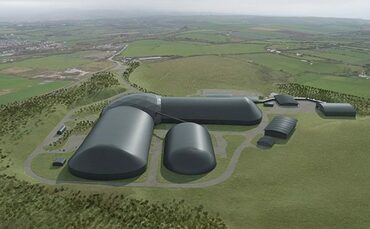

Opposition confirms it would would look to block opening of controversial coal mine, as reports reveal planning inspector has spoken of anguish over pit closures
The fall out from the government's approval of plans for the controversial Woodhouse Colliery in Cumbria has continued, with Labour signalling it would work to block the mine from opening if it wins the next election.
Shadow Energy and Climate Change Secretary Ed Miliband confirmed yesterday that "a Labour government will leave no stone unturned in seeking to prevent the opening of this climate-destroying coalmine, and instead ensure we deliver the green jobs that people in Cumbria deserve".
The move presents a fresh challenge to developers who are already bracing for further delays to the project if as expected environmental groups mount a legal challenge against the government's decision to grant planning permission for the new coking coal mine.
In his formal decision approving the plans for the mine, Levelling Up Secretary Michael Gove endorsed arguments from the planning inspectorate that the mine would result in net zero emissions from its operation and would have a broadly neutral impact on global greenhouse gas emissions given the coal would replace coal that would otherwise be used by steelmakers.
However, the government's analysis has been fiercely contested by energy experts, including independent advisory body the Climate Change Committee, and as such green groups remain confident they could mount a legal challenge against the decision, potentially based on either the Climate Change Act or the UK's commitments under the Paris Agreement.
Writing on Twitter, Greenpeace's Doug Parr said Labour's stance was significant, as it would introduce significant risk for any investors seeking to support the mine. "This might stop the Cumbria coal mine going ahead," he said. "Because that's one hell of a gamble for any investor to start throwing money at it now." Labour have routinely been around 20 points ahead in recent polls, fuelling speculation they could form the next government.
Meanwhile, the Times reported today that the planning inspector who recommended Gove approve the coal mine was a former coal miner who has spoken of his anguish at pit closures.
The Times unearthed comments from Stephen Normington at a separate planning inquiry in County Durham in which he said: "I'm from a mining background. I'm from a pit village. I still live in a pit village. I worked 10 years down the pit. I'm the only inspector ever to work down the pit. The anguish you felt when the steel works closed, I've been part of it so I know what you went through."
The revelations prompted questions from campaigners over whether Normington declared his background as part of the planning inquiry into the controversial project. "The question is, did the Department for Levelling-Up know this before he was appointed and why wasn't there transparency around the inspector's background?" Niall Toru, a lawyer at Friends of the Earth, told the Times.
A spokesperson for Department for Levelling Up, Housing, and Communities said: "When a planning application is called in, an independent inspector is appointed directly by the Planning Inspectorate. All reports to the Secretary of State are reviewed for quality assurance purposes."
Meanwhile, the Planning Inspectorate said Normington was a suitably qualified professional who had been chosen to review the case in part because of his experience in minerals and mining, It also stressed he was subject to professional codes that cover all planning inspectors.
Meanwhile, criticism of the decision to approve a new coal mine continued, with critics rejecting the government's insistence the project would not lead to higher emissions or jeopardise the UK's wider decarbonisation efforts.
Chris Stark, chief executive of the Climate Change Committee, said: "This decision undermines UK efforts towards net zero. It is counter to the UK's aims as COP26 President and it sends entirely the wrong signal to other countries about our climate priorities. Sadly, the UK's global influence on climate is greatly diminished by today's decision."
He also highlighted how the International Energy Agency has said demand for coking coal must reduce by 63 per cent by 2050 if countries achieve their present emissions commitments and by 88 per cent if net zero is achieved globally by 2050.
"In 2020, we gave clear advice in our Sixth Carbon Budget assessment that steel-making in the UK should be entirely low-carbon by 2035," Stark said. "By locking in use of coking coal, this decision appears to narrow the options for decarbonising steel in the UK. With this decision, a strong signal has been given to the market that steel production via hydrogen direct reduction of iron is not favoured by government, despite this technology making most progress internationally as a means of decarbonising steel production.
"Achieving the necessary decarbonisation in the UK now appears to depend on the successful, rapid deployment of carbon capture and storage (CCS) in the UK. If that's the decision, government should make that clear."
In his planning decision, Gove said there was a "recognition that (CCS) needs to be integrated into steel making capacity, but this does not necessarily imply a reduction in blast furnace production".
However, critics were quick to note that there are no large scale CCS projects in the UK and the most advanced projects to decarbonise steel production globally are tending to focus on the deployment of either electric arc furnaces or hydrogen as a replacement for coal. Meanwhile, developers that are planning to deliver CCS infrastructure for projects in the north of England are waiting on the government to provide clarity on the policy framework and subsidy regime under which they will operate.
* This article was originally published here
Comments
Post a Comment